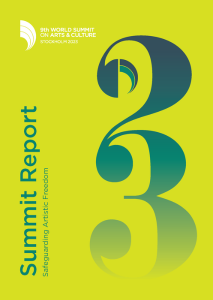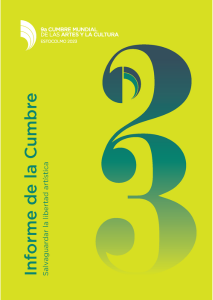Safeguarding artistic freedom in times of polycrisis
This month we are pleased to release the Report on the 9th World Summit on Arts and Culture, which – as IFACCA’s Executive Director, Magdalena Moreno Mujica writes in her introduction – ‘captures the energy and breadth of discussion and debate that took place during our Summit in Stockholm in May 2023 rather than a chronological order of the days and topics. The report shares ideas and conclusions – where they were possible – on risks and urgent actions required.’ In this edition of ACORNS, we share with you some of the key takeaways from the Summit and invite you to engage with the Report (available in both English and Spanish) in full.
The collective conversation at the Summit with speakers and delegates established that artistic freedom is a complex notion, at once both universal and contextual. This calls for a comprehensive approach that considers and addresses all rights included as integral parts of artistic freedom (that is, the right to create and express oneself freely; the right to have one’s work remunerated, supported, and distributed; the rights to freedom of movement and freedom of association; social and economic rights; and the right to participate in cultural life). In addition, it acknowledges that the decision on when to advance the agenda for artistic freedom may vary from one context to another.
The Summit concluded that in these hyper-digital and uncertain times, threats to artistic freedom were increasing, including in countries and contexts that have traditionally excelled in safeguarding these rights and freedoms. It was noted that more subtle and elusive covert threats (such as denial of access to infrastructure or unsustainable working conditions for cultural workers) were growing alongside the more overt, easily observed ones (such as censorship and restrictive legislation).
In this context, the Summit called for strengthening the social value of art and artists towards assuring true agency for the sector to demand accountability from all powers that be. At the same time, the Summit also recognised that the exercise of artistic freedom, by artists and other cultural workers, remains a delicate balance between their rights and responsibilities. The urgent need to redistribute power and resources (including funds, capital, information, and opportunities) was also firmly underlined, both within the cultural and creative sectors worldwide as well as in transnational exchanges. Decolonising the language and approaches we employ within the sector was also highlighted as integral to creating a more inclusive and dynamic environment for all.
The call for continuous and collective action - in alliance with state and non-state actors across sectors and borders - was unequivocal. As Kajsa Ravin, Director General of the Summit’s co-host, the Swedish Arts Council, eloquently appealed, “Let us not just imagine a world where we can improve conditions for arts and culture. My vision is that we can take decisive actions together to make it a reality.”
Please share the Report on the 9th World Summit on Arts and Culture widely in your networks!
Subscribe to ACORNS newsletters
Publicamos el informe de la 9a Cumbre Mundial: Salvaguarda de la libertad artística en tiempos de policrisis
Este mes nos alegra publicar el informe de la 9a Cumbre de las Artes y la Cultura que, como escribe la directora ejecutiva de IFACCA, Magdalena Moreno Mujica en su introducción, “captura la energía y amplitud de las conversaciones y debates que se celebraron durante nuestra Cumbre en Estocolmo en mayo de 2023, en lugar de un orden cronológico de los días y temas. El informe comparte ideas y conclusiones, cuando fueron posibles, sobre los riesgos existentes y las acciones necesarias”. En esta edición de ACORNS le ofrecemos algunos puntos clave de la Cumbre y le invitamos a leer el informe, que está disponible en inglés y español.
La conversación colectiva en la Cumbre con los/as ponentes y delegados/as afirmó la libertad artística como una noción compleja, a la vez universal y ligada a contextos particulares, lo que reclama un enfoque holístico que tenga en cuenta todos los derechos incluidos como parte integral de la libertad artística: el derecho a crear y expresarse libremente, el derecho a un trabajo remunerado, apoyado y distribuido, los derechos a la libertad de movimiento y de asociación, derechos económicos y sociales, y el derecho a participar en la vida cultural. Este enfoque reconoce, además, que la decisión sobre cuándo avanzar en la agenda por la libertad artística puede variar de un contexto a otro.
La Cumbre concluyó que, en estos tiempos inciertos e híperdigitales, las amenazas a la libertad artística están en aumento, incluso en países y contextos que tradicionalmente han destacado en la salvaguarda de estos derechos y libertades. Se constató que, junto con las amenazas más evidentes y fáciles de observar (como la censura y las legislaciones restrictivas), aumentan también las amenazas más sutiles y encubiertas, como la denegación de acceso a infraestructura o las condiciones de trabajo insostenibles para los/las trabajadores/as culturales.
En este contexto, la Cumbre llamó a fortalecer el valor social del arte y de los/as artistas como medio para garantizar una verdadera capacidad del sector para pedir responsabilidades a los poderes correspondientes. A la vez, la Cumbre reconoció también que el ejercicio de la libertad artística por los/as artistas y otros/as trabajadores/as culturales sigue manteniendo un difícil equilibrio entre sus derechos y responsabilidades. Se subrayó con firmeza la necesidad urgente de redistribuir poderes y recursos (como fondos, capital, información y oportunidades), tanto en los sectores culturales y creativos de todo el mundo como en los intercambios internacionales. También se destacó la descolonización del lenguaje y de los enfoques usamos en el sector como parte integral de la construcción de un entorno más inclusivo y dinámico para todos/as.
El llamado a una acción continua y colectiva – aliada con agentes públicos y no gubernamentales en todos los sectores y cruzando fronteras - fue inequívoco. Kajsa Ravin, directora general del coorganizador de la Cumbre, el Consejo de las Artes de Suecia, lo expuso de forma elocuente: “No nos imaginemos solamente un mundo en el que podamos mejorar las condiciones para las artes y la cultura. Mi visión es que podemos adoptar acciones decisivas para hacerlo realidad.”
Por favor, difunda ampliamente el informe de la 9a Cumbre Mundial de las Artes y la Cultura entre sus redes de contacto.



